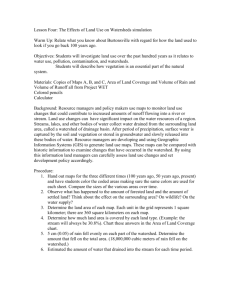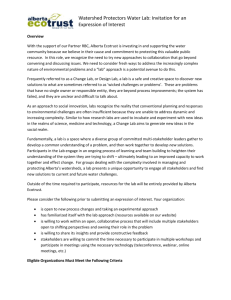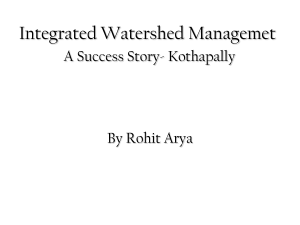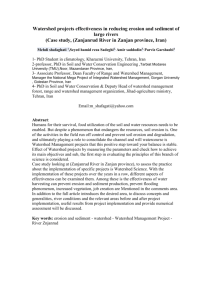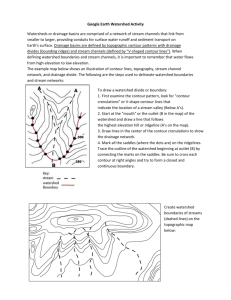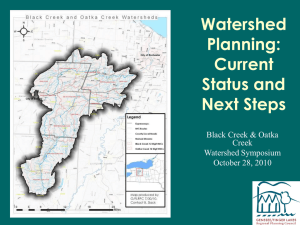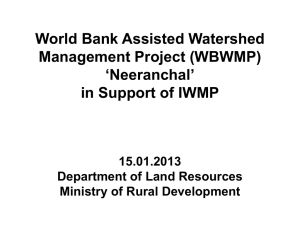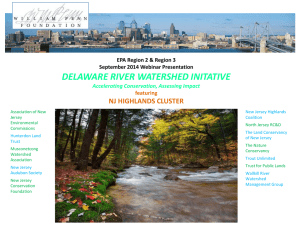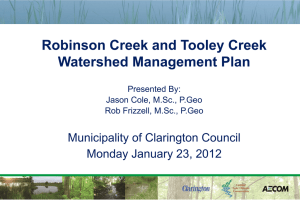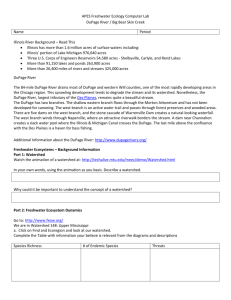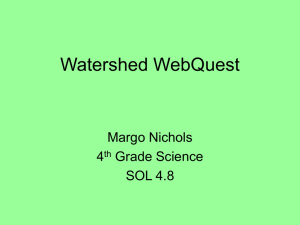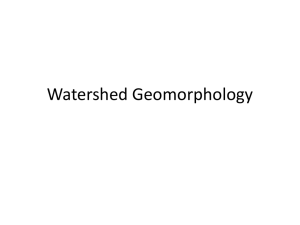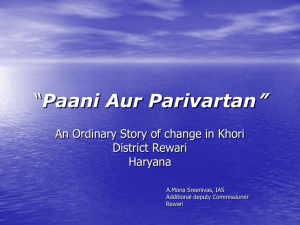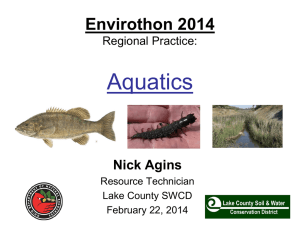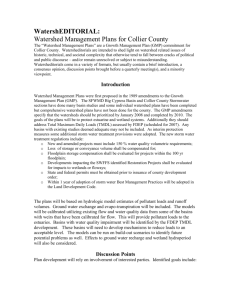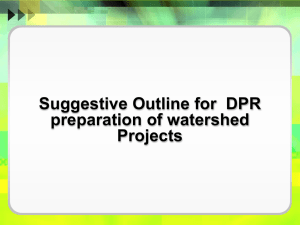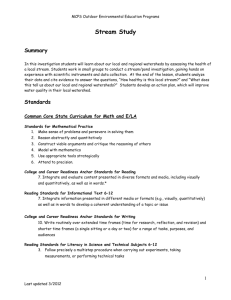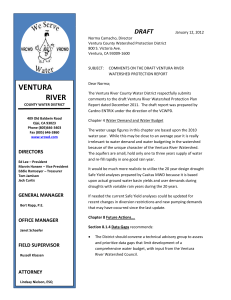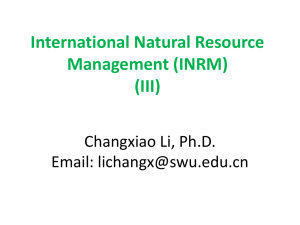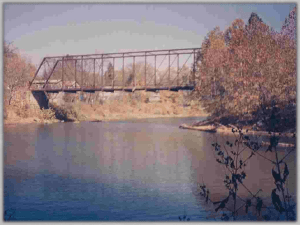Powerpoint
advertisement
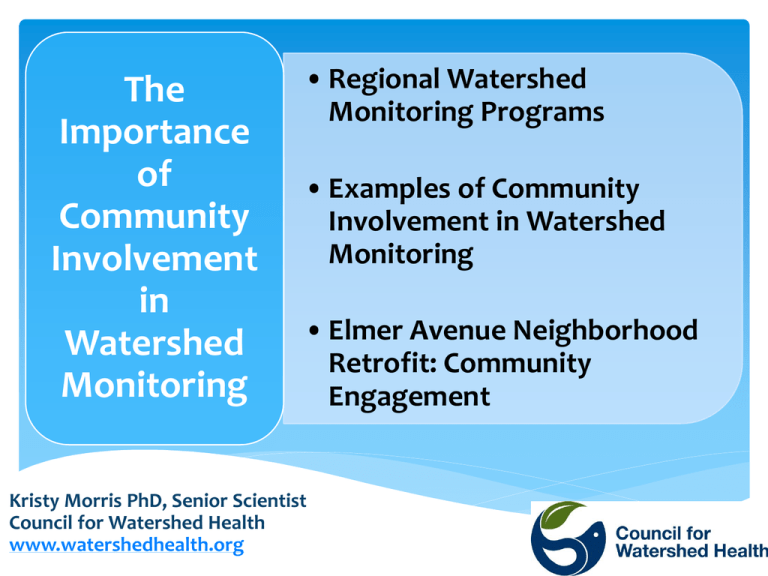
The Importance of Community Involvement in Watershed Monitoring • Regional Watershed Monitoring Programs • Examples of Community Involvement in Watershed Monitoring • Elmer Avenue Neighborhood Retrofit: Community Engagement Kristy Morris PhD, Senior Scientist Council for Watershed Health www.watershedhealth.org Who We Are: Working directly with: • Government agencies • Cities and municipalities • Academia • Corporations • Other non-governmental organizations A Vision for 2025: Sustainable Greater Los Angeles Managing at the watershed scale for economic vitality, social and environmental health Clean waters Reliable local water supplies Restored native habitats Ample parks & open spaces Integrated flood protection Revitalized rivers & communities The work we do: • Watershed research and monitoring • Analysis of watershed-related policy • Watershed planning • Education and outreach • Demonstration projects • Technical products & services Watershed Monitoring Program Approach Bring together watershed stakeholders Compile an inventory of existing effort Develop list of monitoring questions Assess current ability to answer questions Design monitoring program Stakeholders Monitoring Questions 1. 2. 3. What is the health of streams ? How are conditions at areas of unique importance ? Are regulated discharges meeting WQ objectives ? 4. 5. Is it safe to eat fish ? Is it safe to swim? State of the Watershed . What is the health of streams ? •General Constituents •Metals •Nutrients •Organics •Indicator Bacteria •Benthic Macroinvertebrates •Benthic Algae Water Chemistry Bioassessment Condition? Physical Habitat Surveys: SWAMP and CADF&G California Rapid Assessment Method (CRAM) Toxicity 7-day Ceriodaphnia test Monitoring Design Qs 2-5 Q 2 Trends at Unique Sites High use &/or ecological value (CRAM) Confluence points where tributaries meet mainstem (All indicators) Pristine sites in upper watershed (CRAM) Q 3 Meeting Water Quality Objectives Q 4 Safe to eat fish? Q5 Safe to swim? Popular fishing sites Up and downstream of regulated discharges (chemistry and toxicity) Bioassessment downstream resident fish sp. (Hg, Se, DDT’s & PCBs) Popular freshwater swimming sites (E.coli) Summary of monitoring activities LARWMP 2009 Monitoring Sites (Q1-5) Estimated Number of samples collected Program Years Samples SGRRMP 2005-2010 >515 LARWMP 2007-2010 >288 >803 Many more analyses…. Condition of streams (Los Angeles • • • • and San Gabriel Rivers Watersheds) Biological communities degraded; mostly in lower watersheds Very few exceedances of water quality standards Few toxic endpoints The biological condition is strongly associated with physical habitat conditions What can you do? Volunteer Locally Heal The Bay-Malibu Stream Team FOLAR Surfrider Foundation Coastkeeper Alliance Waterkeeper Alliance Baykeeper Alliance Santa Monica Baykeeper Santa Barbara Channelkeeper Stream Teams Ventura Stream Team San Diego Stream Team Audubon Society Ventura Stream Team: Informing policy development Santa Barbara Channelkeeper, Ventura Surfrider foundation + 500 volunteers 6000 volunteer hours in 10 years Monthly sampling identified excessive nutrients Image: http://stream-team.org/index.html Ventura Stream Team: Informing policy development Ventura River listed on 303(d) list for algae impairment Channelkeeper's Stream Team data is being utilized to facilitate development of an Algae TMDL for the River. Image: http://stream-team.org/index.html San Diego Coastkeeper: Using baseline data to recognize and Quantify the effects of a sewage spill Los Penasquitos Creek: Saturday, Sept 10 2011 Downstream Upstream of spill Contact Kristy Morris, PhD Sr Scientist/ Water Quality Council for Watershed Health 700 N. Alameda St. Los Angeles, CA 90012 kristy@watershed.org www.watershedhealth.org Ph: 213.229.9960 Fax: 213.229.9952
